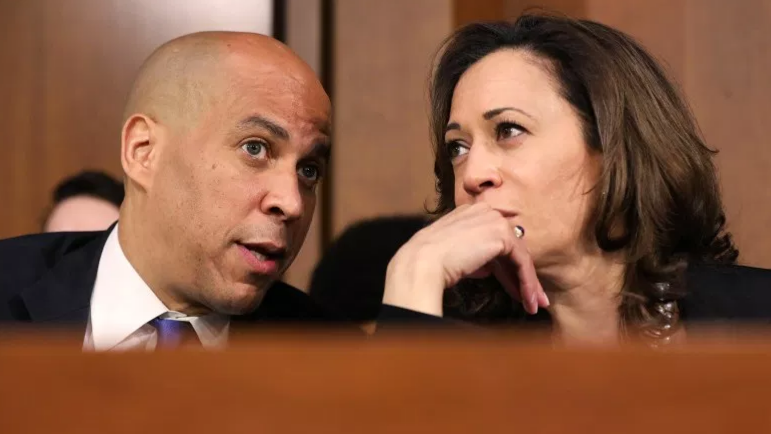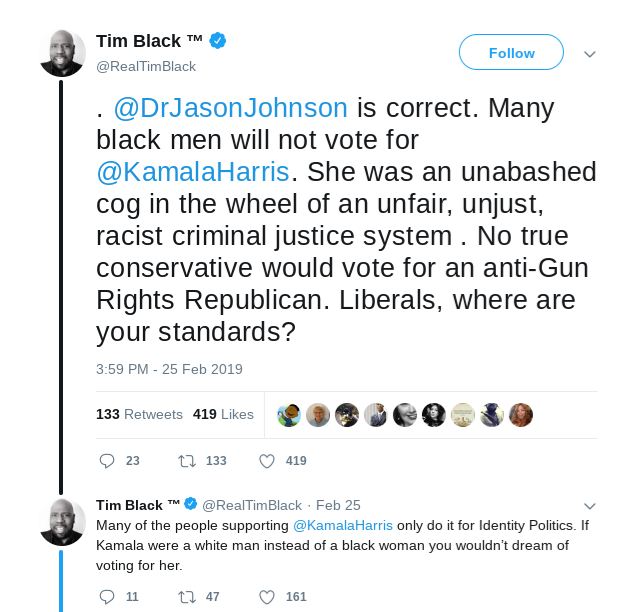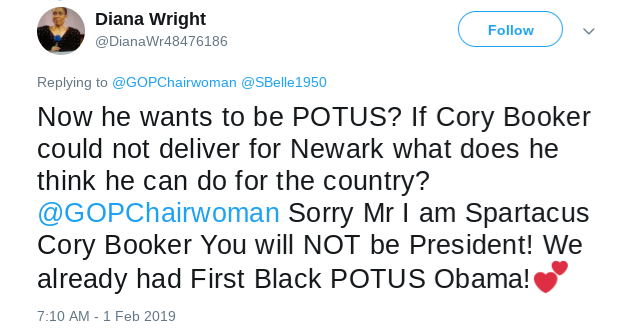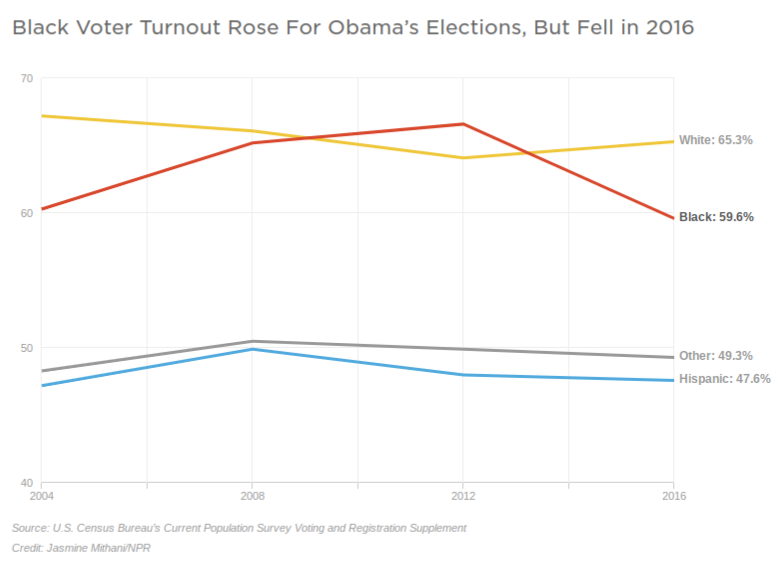"As both get deeper into their presidential campaigns, the question arises, who gets the black vote?"
-- Sunari W-A.
This past month, two prominent members of the congressional black caucus--Kamala Harris and Cory Booker--announced bids for the 2020 presidential election. As both get deeper into their presidential campaigns, the question arises, who gets the black vote? To what extent is this a gender or merit based-decision, or rather one based on initiative and black-centric policies? Well, black twitter argues for the latter. The courtship for the black vote begins with both political history and cultural credibility.
Since Harris’ January 21st announcement, on the steps of her historically black alma mater, she’s been met with both excitement and criticism- social media the breeding ground for both. She capitalizes on her appeal as a female candidate of color, being the second black woman to ever run for POTUS. Even her red and yellow campaign logo is derived from Shirley Chisholm, the first black woman to run for office in 72’.
Still, many are hesitant to accept her role as the “black candidate,” being that she is the child of Indian and Jamaican immigrants and is married to a white man. However, in an interview on The Breakfast Club, she addresses these critics, saying “I'm black, and I'm proud of being black. I was born black. I will die black, and I'm not going to make excuses for anybody because they don't understand." It’s evident that her black candidacy is a point of pride. Her campaign was announced at Howard University, and her first rally was held in Oakland (on MLK Day), both personal settings for her. Both with a rich black history. And yet, some twitter users just don’t know when to quit. But, fear not, black twitter never misses a beat:
Since Harris’ January 21st announcement, on the steps of her historically black alma mater, she’s been met with both excitement and criticism- social media the breeding ground for both. She capitalizes on her appeal as a female candidate of color, being the second black woman to ever run for POTUS. Even her red and yellow campaign logo is derived from Shirley Chisholm, the first black woman to run for office in 72’.
Still, many are hesitant to accept her role as the “black candidate,” being that she is the child of Indian and Jamaican immigrants and is married to a white man. However, in an interview on The Breakfast Club, she addresses these critics, saying “I'm black, and I'm proud of being black. I was born black. I will die black, and I'm not going to make excuses for anybody because they don't understand." It’s evident that her black candidacy is a point of pride. Her campaign was announced at Howard University, and her first rally was held in Oakland (on MLK Day), both personal settings for her. Both with a rich black history. And yet, some twitter users just don’t know when to quit. But, fear not, black twitter never misses a beat:
Cory Booker, a fellow Democratic congressmen, announced his candidacy on the first day of Black History Month. Booker was Newark’s mayor for seven years, then New Jersey’s first black senator. Before his political career, Booker studied at Stanford, Yale and Oxford--woah. His announcement was followed by a drumline, with the slogan “we rise up,” derivative of the Maya Angelou poem. His announcement video was met with some excitement, but also an onslaught of mockery. Many twitter users referencing the Kavanaugh hearing, where he threatened to “leak” documents that weren’t technically confidential in the first place, then announcing that it was his “‘I am Spartacus’ moment.” Despite this arguably embarrassing, possibly noble public display, black twitter takes no prisoners:
Many note Harris’ history of being tough on crime, most citing a disproportionate effect on people of color. Before becoming the second black woman to be elected to the US Senate, Harris was San Francisco's district attorney, then California’s attorney general. In a scathing op-ed in The New York Times, Lara Bazelon, law professor and the former director of the Loyola Law School Project for the Innocent, argues just that. She writes that despite Harris’ reputation as a “progressive prosecuter” meaning one who embrasses justice reform, Harris fought to uphold wrongful convictions and championed state legislation that “would disproportionately affect people of color.” Where Bazelon’s work ended, the social network’s work began. There’s no better target for black twitter than a seemingly false champion of black people.
Unlike their possible presidential predecessor, Barack Obama, both Harris and Booker kicked off their campaigns with an emphasis on their black candidacy. See the similar layout of either’s campaign website, and that becomes abundantly clear. Booker mentions the racially charged hardships of his adolescence and his mother’s motivational references to their African American ancestry. Harris takes a more assertive approach; denoting herself as a civil rights leader, while also mentioning her unprecedented appointment as her state’s first black attorney general.
The New York Times estimates that of 4.4 million non voters in the 2016 election, 36% were black. NPR states that in both the Virginia gubernatorial and Alabama senate races in 2017, black voters were not only courted, but a post-election analysis suggests that black voters, specifically black women, were vital to the Democratic victories in both states. After the midterms, the NAACP and the African American Research Collaborative conducted a study examining the function of the black vote amongst various elections. The conclusion was simple; “Democrats’ 2018 wins across the country were dependent on voters of color, particularly Black voters, as a majority of white voters supported Republicans.”
When it pertains to Booker, Harris or any other Democratic candidate, votes of color can make or break a potential nomination. Without the minority vote, America would not have had their first black president, the same will be true of a second. However, this time around, cancel culture and receipt archaeologists have no hesitation in uncovering a prominent person’s problematic past. Despite their self-promotion as “the black presidential candidate,” people are critical of their political motives: how can you be the black candidate if you supported policies disadvantaging men of color, or back questionable Republican policies. Unfortunately, the more the black vote is split, the worse off either one will be in 2020-specifically against another Trump campaign.
With exception of Ben Carson, black candidates are usually met with the enthusiasm and support of the black community. However, this time around black twitter makes sure their representees aren’t so quick to endorse. With the history and politics of Harris and Booker at their fingertips, the platform is using a onslaught of expose-like tweets and expertly crafted comments to negate blind support, and truly holding these candidates accountable.
With exception of Ben Carson, black candidates are usually met with the enthusiasm and support of the black community. However, this time around black twitter makes sure their representees aren’t so quick to endorse. With the history and politics of Harris and Booker at their fingertips, the platform is using a onslaught of expose-like tweets and expertly crafted comments to negate blind support, and truly holding these candidates accountable.




